Martha Argerich Plays Mozart
Introduction
It's about time I saw Martha Argerich play 'live'. I can think of at least three times I've booked tickets for concerts in which she's been advertised to perform, but, for various reasons she didn't turn up. I've probably worn out the few CDs I have of her, and so it was with great anticipation that I watched this DVD.
The first thing I need to mention is that there seems to be a small problem between what we are promised in the menu items (and the booklet) and what we actually see. The two concerti are certainly as they should be, but when I selected the 'Rondo in C major', what I got was the Finale of Beethoven's Triple Concerto (which isn't mentioned at all). The Mozart Rondo does appear however, immediately after the Adagio in E major, making a slightly jarring key change, but a fairly satisfying two-thirds of a violin concerto 'that never was'.
A viola soloist by the name of Lyda Chen (Argerich's daughter) is also mentioned, but never seen, at least not in the guise of a soloist. Perhaps she is tucked away in the orchestra, and speaking as a violinist, that's the best place for any viola player.
This whole concert appears to be centred around Argerich's friendship with her erstwhile mentor and teacher, Friedrich Gulda, who was himself a great Mozartean. Gulda's sons from each of his marriages are her co-performers in the triple concerto in F. In the other triple concerto (not advertised), she is joined by the French brothers Renaud and Gautier Capuçon - who I don't believe have any connection with Gulda and his two wives, or Argerich and her three (at the last count) husbands.
Video
A clear and natural picture.
Audio
It may be due to the position of the microphone, but the D minor concerto is very piano-heavy, and the sound brings out much of Argerich's forcefulness, which may not have sounded so harsh in the concert hall itself, but is certainly noticeable on this disc.
The sound is better when the three pianos are playing. and even better still for the solo violin pieces and the symphony.
Extras
I'm not sure why we have 'bonus performances', as they are all clearly from the same concert, and so surely should be shown as part of that concert. As it is, they are the symphony and the Adagio (followed by the Rondo as menioned earlier) and a very short, and, to be honest, fairly pointless 'Behind the Scenes' that lasts for two and a half minutes, and in which you learn nothing.
Conclusion
Overall, this is a quite disappointing disc. Much of Argerich's playing is old-style, and very heavy handed and as I have mentioned, not helped at all by the closeness of the microphone. One or two moments in the slow movement of K466 are beautiful, but the outer movements are a little haphazard, as if her heart really isn't in it. Also, playing a D minor triad just after she sits down to start is just peculiar.
The Mozart Triple, in which she is joined by Gulda's sons, is quite jolly, and Argerich graciously takes a back-seat by playing the 'simple' part (famously played by West German Chancellor Helmut Schmidt in the EMI recording with Christoph Eschenbach and Justus Frantz), but almost completely ruined by a bizarre, and seemingly under-rehearsed cadenza in the last moment.
The Beethoven Triple (did I say that this isn't mentioned anywhere?) stands out like a sore thumb, and played accordingly.
The most satisfying parts of the concert are the violin works and the symphony. Renaud Capuçon has a beautiful sound (apparently playing on a violin once owned by Isaac Stern), and makes a good case for these 'minor' pieces, and the New Japan Philharmonic play well throughout.
I'm not sure this is Argerich's best hour, or to be more exact, her best repertoire, which is a great shame.
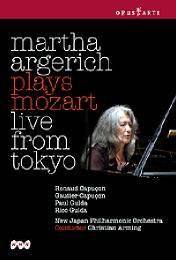
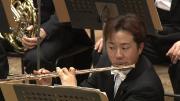
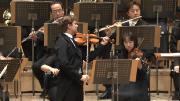
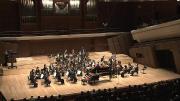
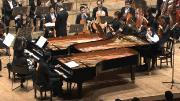

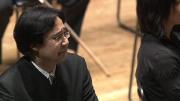
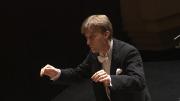
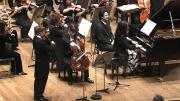
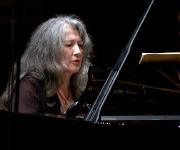

































Your Opinions and Comments
Be the first to post a comment!